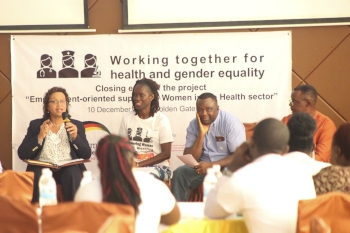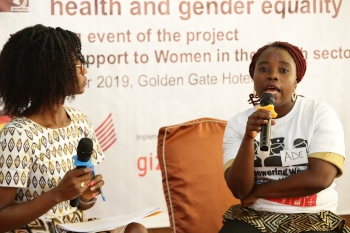Looking back on a 3-year project that improved career opportunities for women in Liberia’s health workforce
On 10 December 2019, health, education and gender stakeholders gathered to review, celebrate and jointly close three years of Liberian-German collaboration on improving women’s opportunities in the health sector. Personal testimonies showed how the project made a difference for pupils, university teachers and students, managers of health facilities and ministerial officials alike.
From 2017 to 2019, the Deutsche Gesellschaft für Internationale Zusammenarbeit (GIZ) GmbH on behalf of the Federal Ministry for Economic Cooperation and Development (BMZ) implemented the innovative Liberian-German project “Employment-oriented support to Women in the Health sector” (EWH). It focused on five counties in rural southeast Liberia and was part of broader programme of Liberian-German cooperation in health aimed at strengthening Liberia’s health system after the Ebola outbreak.
The project’s closing event was hosted by the Ministry of Health, the Liberian government’s lead agency for this project, and took place under the patronage of Hon Norwu Howard, Deputy Minister for Administration and responsible for Liberia’s public sector health workforce as. The Ministry of Education was represented by the Deputy Minister for Instruction, Hon Alexander Duopu, and the Ministry of Gender, Children and Social Protection by the Assistant Minister for Research, Policy & Planning, Hon Roosevelt Klafleh.
Panellists agree that empowering women in the health workforce is a smart investment

In a panel discussion amongst Hon Duopu and Hon Klafleh, the Assistant Minister of Health for Preventive Services, Hon Joyce Sherman, the County Health Officer of Grand Kru, Dr Siana Jackson Mentoe, and the Assistant Director for Human Resources Development at the Ministry of Health, Marvin Davis, panellists stressed the need for an inclusive and gender equitable approach to health workforce planning, -development and -management. The proportion of women in Liberia’s workforce is increasing but attrition in rural areas is higher among women than men. Also, women are mainly found in ‘caring’ professions, and rarely in higher-paid ‘technical’ and leadership roles such as doctors.
Dr Jackson Mentoe recalled a moment when she was preparing to perform a surgery and her patient asked: ‘Where is the doctor?’ When she responded that she was the doctor, the patient couldn’t believe it. According to Dr Jackson Mentoe, female role models in medical professions are critical to show young women ‘If she can do it, I can do it’. The other discussants concurred that support to women’s empowerment in the health workforce could improve health system performance, promote gender justice and Liberia’s national development overall. They also underlined that women and men had to work as partners to succeed in this quest.
Tackling gender-related barriers at each stage of a female health worker’s career
Next, Viktor Siebert, Project Director at GIZ, explained what the project set out to achieve and the methods it employed to do so. The project’s overall goal was to improve career opportunities for women in Liberia’s health workforce so that more women would take up the ‘technical’ healthcare professions and the (higher-paid) leadership positions currently dominated by men. The interventions followed a health worker career life cycle approach: Women were supported at the successive stages of their career development, starting with their career choice in high school, followed by pre-service training through to recruitment, employment and retention, and more long-term career development. At each of these stages, tailored interventions sought to tackle the gender-related barriers preventing women from continuing their career in the health service. This holistic approach was designed to achieve both short- and long-term results. In the short term, the aim was to strengthen the participating women’s individual capacities and opportunities; in the longer-term, the project aimed to create the necessary momentum for institutional and social change towards greater gender responsiveness and gender equality.
How the project made a difference: Facts, figures and personal testimonies

In the next session, the GIZ technical advisors and project beneficiaries jointly presented the results achieved by each of the project’s core interventions.
Career choice: A national career guidance and psychosocial counselling policy for Liberian schools was adopted by the Ministry of Education. 17 high schools in Sinoe and Grand Gedeh with more than 4,800 students including 43% girls participated in gender-sensitive career guidance activities and the share of girls well informed about health careers rose from 33% to 64% within a year (see this article for more details). A recent high school graduate who participated in a career day shared how this day motivated and helped her embark on a career in the medical laboratory field.
Gender audits with 398 participants and capacity development activities were implemented at the three health training institutions Tubman University, Cuttington University and Mother Patern College of Health Sciences (see this article for more details). The gender director at Tubman University explained how the project’s interventions greatly enhanced her institution’s gender responsiveness.
Scholarships: 54 women received scholarships through the Ministry of Health for entry-level and advanced training in health sector professions with low female representation (e.g. lab techs, physician assistants). One aspiring laboratory technician who received a scholarship to complete her training testified that this support had been critical for her.
Gender trainings: The gender focal person of the Ministry of Health explained how the project had ensured that 36 Ministry of Health human resources (HR) officials received gender training, 11 gender activities were included in the Ministry’s HR policy action plan (see this article for more details). Her own role was also better defined with support from the project. The Ministry of Health launched a campaign to protect employees against sexual harassment at the workplace.
Leadership programme: 50 women officers in charge of health facilities in southeast Liberia completed a leadership development programme and one of them from a small clinic in rural Maryland county shared how this experience had motivated her to continue her often challenging work (see this article for more details).
Sustaining the momentum
In the final session of the event, participants discussed how to sustain the momentum after the end of the project, coming up with specific recommendations for their institutions. While the EWH project comes to a close, Germany will continue to support gender-equitable health workforce development in Liberia through the new ‘health systems strengthening and epidemic prevention’ project that will start in 2020.
As reference document for interested colleagues, for those involved in any of the project’s past and in possible future interventions, the project prepared the publication “Working together for health and gender equality”. It contains a more detailed description of the EWH project, its approach and results as well as stories from its beneficiaries, including those mentioned above.
Further information:
All articles about project interventions and the tools it developed can be found under the following links:
- Article about health career guidance
- Health careers booklet for high school students
- Gender audit toolbox for health training institutions
- Gender and health workforce bibliography
- Training manual for gender responsive HRH management
- Article about leadership development programme
Viktor Siebert, December 2019

